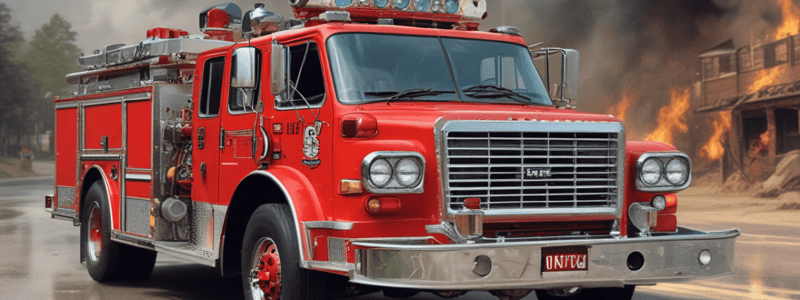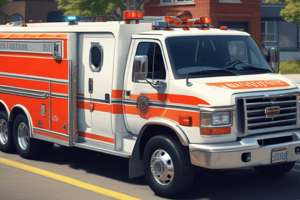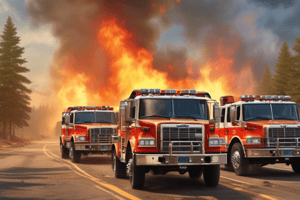Podcast
Questions and Answers
What is the primary responsibility of the Fire Service?
What is the primary responsibility of the Fire Service?
- To testify in legal proceedings
- To save lives and protect property
- To assume legal accountability
- To provide a specific service to the community (correct)
Why is it unacceptable to say 'I don't remember' during a legal proceeding?
Why is it unacceptable to say 'I don't remember' during a legal proceeding?
- Because it undermines credibility
- Because it's unprofessional (correct)
- Because it's a legal requirement to remember
- Because it's not a valid response
What is the purpose of writing down observations and actions during an emergency situation?
What is the purpose of writing down observations and actions during an emergency situation?
- To provide additional credibility to oral testimony (correct)
- To fulfill a legal requirement
- To refresh one's memory of the incident
- To provide evidence in legal proceedings
What can happen to memory over time?
What can happen to memory over time?
When might a firefighter be expected to testify?
When might a firefighter be expected to testify?
What is a consequence of relying on memory to provide accurate information?
What is a consequence of relying on memory to provide accurate information?
What information should be recorded when items are to be used as evidence?
What information should be recorded when items are to be used as evidence?
What should you do before testifying in court using your notes?
What should you do before testifying in court using your notes?
What should you do when using your memo book during testimony?
What should you do when using your memo book during testimony?
What should you say when asked, 'Are you an expert?' in court?
What should you say when asked, 'Are you an expert?' in court?
What information should be recorded when taking photographs at an emergency scene?
What information should be recorded when taking photographs at an emergency scene?
Why is it important to follow the guidelines for note-taking and evidence collection?
Why is it important to follow the guidelines for note-taking and evidence collection?
According to the note-taking guidelines, why is it essential to be objective and honest when making notes?
According to the note-taking guidelines, why is it essential to be objective and honest when making notes?
What should you do if you make an error while writing notes?
What should you do if you make an error while writing notes?
What information should you record when interviewing a witness?
What information should you record when interviewing a witness?
Why is it important to write notes in chronological order?
Why is it important to write notes in chronological order?
What should you do with your notes after an emergency situation?
What should you do with your notes after an emergency situation?
What should you do if you remember something at a later date when writing notes?
What should you do if you remember something at a later date when writing notes?
Why is it essential to include the date, time, and location of the event in your notes?
Why is it essential to include the date, time, and location of the event in your notes?
What should you do when interviewing a witness in a situation where a person may be charged with an offence?
What should you do when interviewing a witness in a situation where a person may be charged with an offence?
Why is it important to write notes in ink using a single color and a single pen?
Why is it important to write notes in ink using a single color and a single pen?
What should you do when taking notes in an emergency situation?
What should you do when taking notes in an emergency situation?
Study Notes
Importance of Note Taking in Fire Service
- As a firefighter, you will be expected to testify during a legal proceeding, and you must be able to provide accurate information about your actions and experiences during an emergency situation.
- Relying on memory to provide accurate information is not acceptable, and written notes can refresh your memory and provide additional credibility to your oral testimony.
- Records made in the ordinary course of business are admissible in evidence.
Objectives
- Know why note taking is an important component of duties
- Be able to state two reasons for making notes
- Know the minimum standards of effective note taking
- Know the basic considerations when taking notes
- Know the information required for exhibits
- Know the documentation required for photographs
- Know how to use notes in court
Reasons for Note Taking
- To complete Toronto Fire Services reports and forms
- As a reference for any legal proceedings resulting from involvement at an emergency scene
Minimum Standards for Note Taking
- Be objective and honest when making notes; do not offer opinions, only direct observations
- Notes should start with the date, time, and location of the event being recorded
- Write legibly in ink using a single color and a single pen
- Draw a line to indicate the end of each entry
- Do not skip any lines
- Write in chronological order to ensure all information is captured
- Notes may be read by both the Crown Attorney and the defendant’s lawyer during legal proceedings
- You alone should write all notes in your memo books/file
- Do not write notes in collaboration with others
- Write notes as soon as possible after the emergency situation
- If you make an error, place a single line through the word, sentence, or passage, and initial at each end of the line
- Do not change any notes you have written
- If you remember something at a later date, add it to the end of your notes for that particular situation
- The more detail you include in your notes, the better you will be able to answer questions at a later date
Basic Considerations when Taking Notes
- Date and time alarm received
- Time of arrival at emergency location
- Weather conditions
- Was the owner/occupant or visitors present upon arrival?
- Who reported the incident and how was it reported?
- Who discovered the situation and how did they discover it?
- Was the building secure, doors unlocked, windows open, etc.?
- What were your observations upon arrival?
- What did you do upon arrival?
- If there was a fire, was there more than one fire location, and what color were the flames?
- Who was the first firefighter to make entry and how did they make entry to the building?
- If persons at the scene were interviewed, follow the information provided under Minimum Standards for Note Taking
- Location of any victims and their condition
- Who found the victims, and who removed the victims from the location where they were found?
- Names, badge/employee number of any other emergency service personnel on scene
Information Required for Evidence
- Where was the item found?
- When was it found?
- Who found it?
- How did they find it?
- How was the item protected (Continuity of possession)?
- Was an identifying mark placed on the item?
Information Required for Photographs
- Photographer’s name, telephone number, organization for whom they work
- Date and time the photograph was taken
- Location of the object(s) being photographed
- Description of the object(s)
- Angle from which the photograph was taken
- Provide a sketch of the location of the object in relation to doors, windows, street, etc.
Using Notes in Court
- Read your notes over prior to testifying
- If you must refer to your notes during your testimony, ask permission of the judge before doing so
- You may be asked questions prior to being allowed to make reference to your notes, such as:
- Are the notes yours?
- Are the notes in your handwriting?
- When were the notes made?
- Have there been any additions, deletions, or changes to the notes since they were made?
- If using your memo books while giving evidence, ensure that the desired section is pre-selected
- If you are asked, “Are you an expert?” you should state, “I have not been qualified as one.”
Studying That Suits You
Use AI to generate personalized quizzes and flashcards to suit your learning preferences.
Description
This quiz covers the accountability of the Fire Service to the community, and the legal responsibility of firefighters, including testifying in legal proceedings. It's essential for firefighters to understand their role in saving lives and protecting property.



